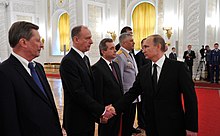Silovik


In the Russian political lexicon, a silovik (Russian: силовик, IPA: [sʲɪlɐˈvʲik]; plural: siloviki, Russian: силовики, IPA: [sʲɪləvʲɪˈkʲi]) is a person who works for any state organisation that is authorised to use force against citizens or others. Examples are the Russian Armed Forces, the Russian national police, Russian national drug control (GUKON), Russian immigration control (GUVM), the Ministry of Justice, the Federal Security Service (FSB), former KGB personnel, Main Intelligence Directorate of the Russian General Staff (GRU), the Foreign Intelligence Service (SVR), and the Federal Protective Service (FSO). This word is also used for a politician who came into politics from these organisations.[1]
Siloviki is also used as a collective noun to designate all troops and officers of all law enforcement agencies of post-Soviet countries, not necessarily high-ranking ones.
Etymology
The term siloviki ('siloviks') is literally translated as "people of force" or "strongmen" (from Russian сила, "force" or "strength"). It originated from the phrase "institutions of force" (Russian: силовые структуры), which appeared in the early Boris Yeltsin era (early 1990s) to denote the military-style uniformed services, including the military proper, the police (Ministry of Internal Affairs), national security (FSB) organisations, and some other structures.[2]
A similar term is "securocrat" (law enforcement and intelligence officer).[1] Daniel Treisman in turn proposed a term "silovarch" (silovik and oligarch).[3]
Description
Siloviki often wish to encourage a view that they might be seen in Russia as being generally non-ideological, with a pragmatic law-and-order focus and Russian national interests at heart. They are generally well educated and bring past commercial experience to their government posts.[4] It is assumed that siloviki have a natural preference for the reemergence of a strong Russian state.[4]
The siloviki do not form a cohesive group. They do not have a single leader and there is no common, articulated "silovik agenda". However, according to John P. Willerton, these security-intelligence officials brought the work ethic and skills—that Putin apparently favoured—to the administration.[4]
A former KGB general said that "a Chekist is a breed... A good KGB heritage—a father or grandfather, say, who worked for the service—is highly valued by today's siloviki. Marriages between siloviki clans are also encouraged."[5]
Persons and positions

Senior siloviki under the presidency of Vladimir Putin include Sergei Ivanov, Viktor Ivanov, Sergei Shoigu, Igor Sechin, Nikolai Patrushev, Alexander Bortnikov, and Sergey Naryshkin who have had close working relationships with Putin and held key positions in Putin's governments.[6][7] Willerton points out, however, that it is difficult to assess if their common security-intelligence background translates into common political preferences.[4]
Following the 2011 Russian protests, Russian president Dmitry Medvedev, having made promises of political reform, nevertheless appointed several siloviki to prominent positions in the government: Sergei Ivanov to chief of staff of the presidential administration; Dmitry Rogozin to deputy prime minister; and Vyacheslav Volodin to deputy chief of staff.[8]
Putin's chief national security adviser, Nikolai Patrushev,[9] who believed that the West has been in an undeclared war with Russia for years,[10] was a leading figure behind Russia's updated national security strategy, published in May 2021. It stated that Russia may use "forceful methods" to "thwart or avert unfriendly actions that threaten the sovereignty and territorial integrity of the Russian Federation".[11][12]
See also
- Alphabet boy
- Chekism
- Counterintelligence state
- Deep state
- Military junta
- National security state
- Police state
- Political groups under Vladimir Putin's presidency
- Putinism
- Russia under Vladimir Putin
References
- ^ a b Illiarionov, Andrei (2009). "Reading Russia: The Siloviki in Charge". Journal of Democracy.
- ^
For example:
"Russian Politics and Law, Volumes 29-30". Russian Politics and Law. 29–30: 90. 1990. Retrieved 23 July 2014.
[...] the supreme leader, who firmly relies on the structures of force (the army, state security, the Ministry of Internal Affairs) [...]
- ^ Treisman, Daniel (1 December 2007). "Putin's Silovarchs". Orbis. 51 (1): 141–153. doi:10.1016/j.orbis.2006.10.013. ISSN 0030-4387.
- ^ a b c d Willerton, John (2005). "Putin and the Hegemonic Presidency". In White, Gitelman; Sakwa (eds.). Developments in Russian Politics. Vol. 6. Duke University Press. ISBN 978-0-8223-3522-1.
- ^ "Russia under Putin. The making of a neo-KGB state". The Economist. 23 August 2007. Retrieved 21 April 2022.Archived 12 April 2016 at the Wayback Machine, The Economist, 23 August 2007.
- ^ "Vladimir Putin: The security men, officials, and friends who are in Russian president's inner circle". Sky News. 28 February 2022.
- ^ Langton, James (15 March 2022). "Meet Russia's siloviki — Putin's inner circle". The National.
- ^ Andrew E. Kramer (28 December 2011). "Political Promotions in Russia Appear to Belie President's Promise of Reform". The New York Times. Retrieved 30 December 2011.
- ^ Troianovski, Anton (30 January 2022). "The Hard-Line Russian Advisers Who Have Putin's Ear". The New York Times. Retrieved 28 March 2022.
- ^ Galeotti, Mark (5 July 2021). "New National Security Strategy Is a Paranoid's Charter". The Moscow Times. Retrieved 28 March 2022.
- ^ "Russia's security strategy envisages 'forceful methods'". ABC News. 31 May 2021. Retrieved 28 March 2022.
- ^ Paulick, Jane, ed. (11 March 2022). "Putin's inner circle: Who has the Russian president's ear on the war in Ukraine?". Deutsche Welle. Retrieved 28 March 2022.
Further reading
- Brian D. Taylor. (2017). The Russian Siloviki and Political Change. Daedalus (journal).
- "The making of a neo-KGB state". The Economist. The Economist Newspaper Limited. 25 August 2007. Retrieved 24 August 2007.
- Routledge Handbook of Russian Politics and Society
